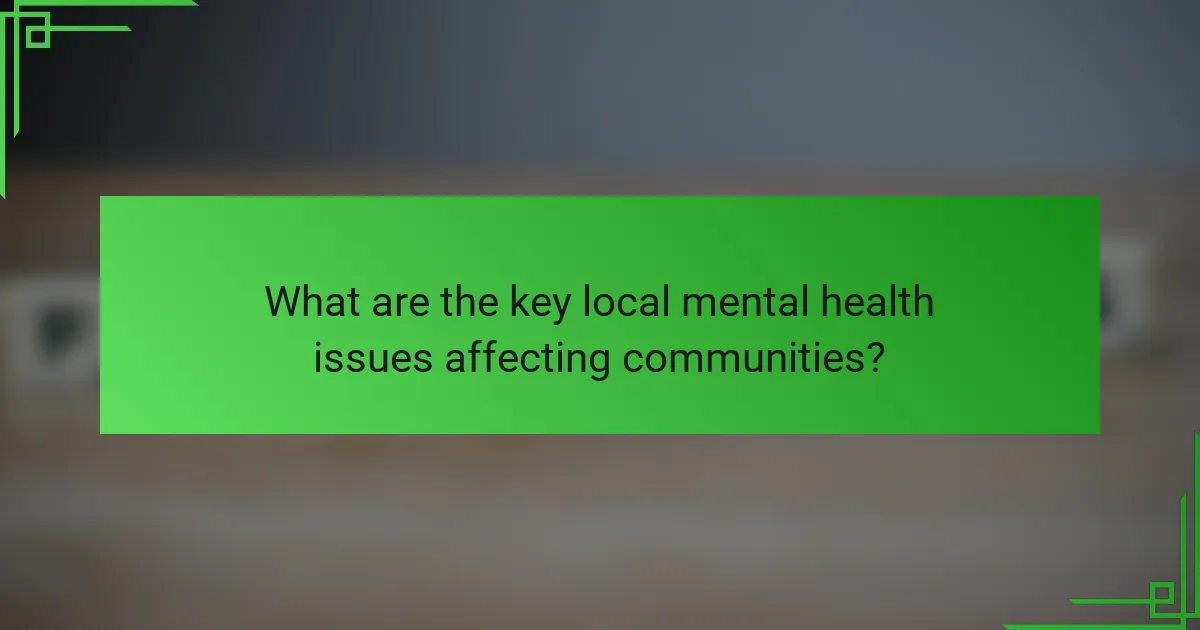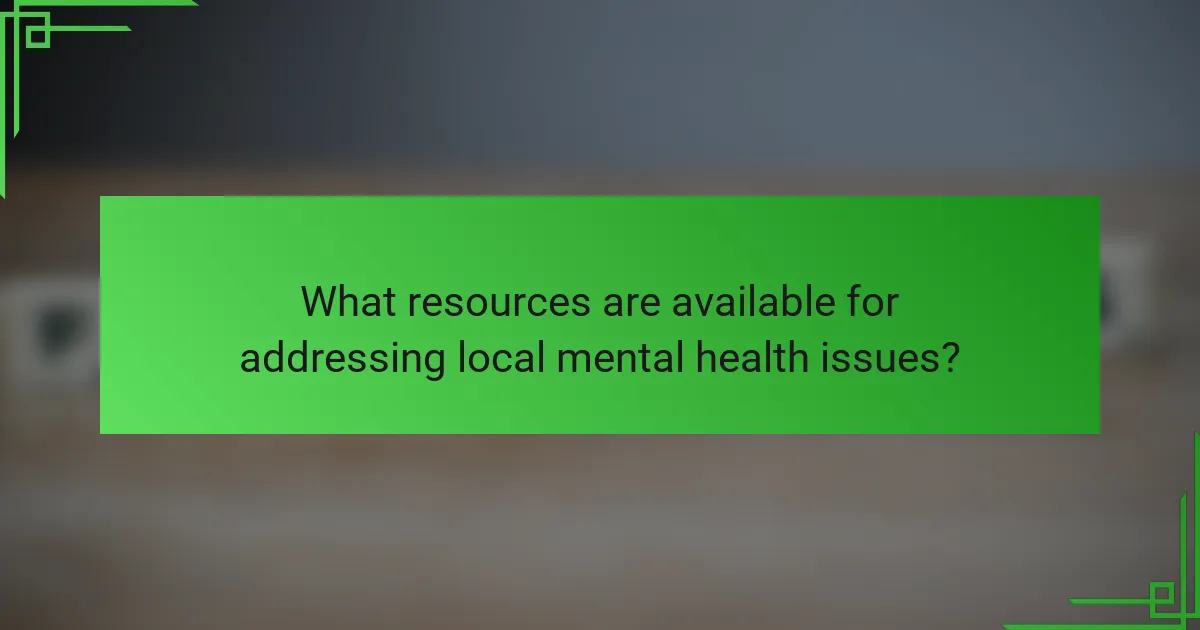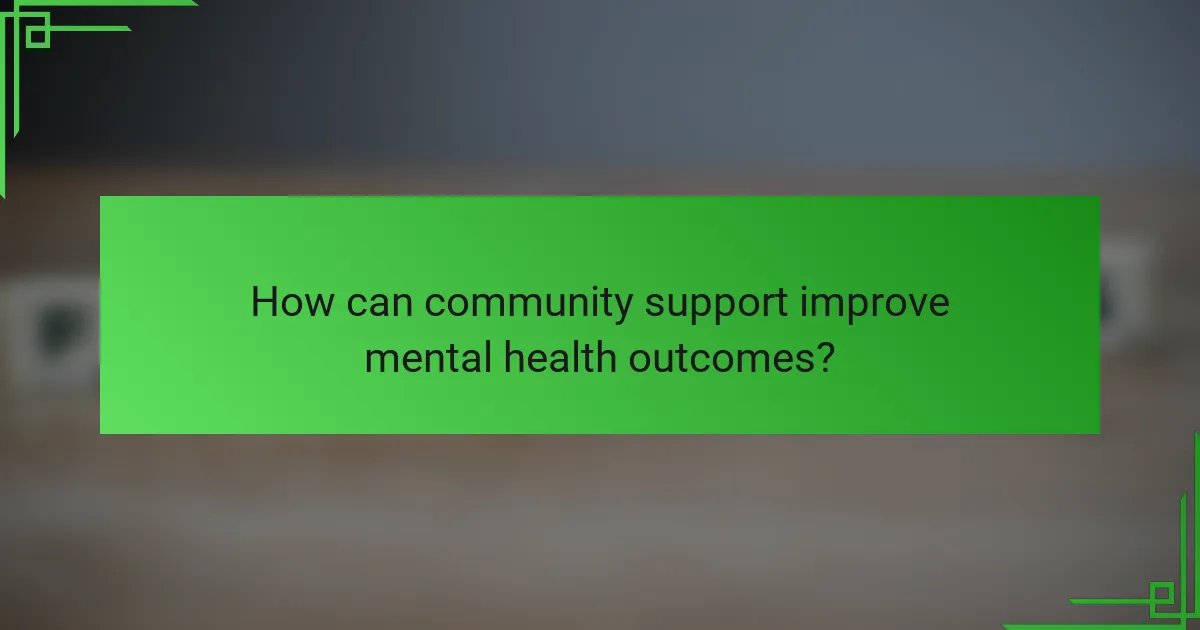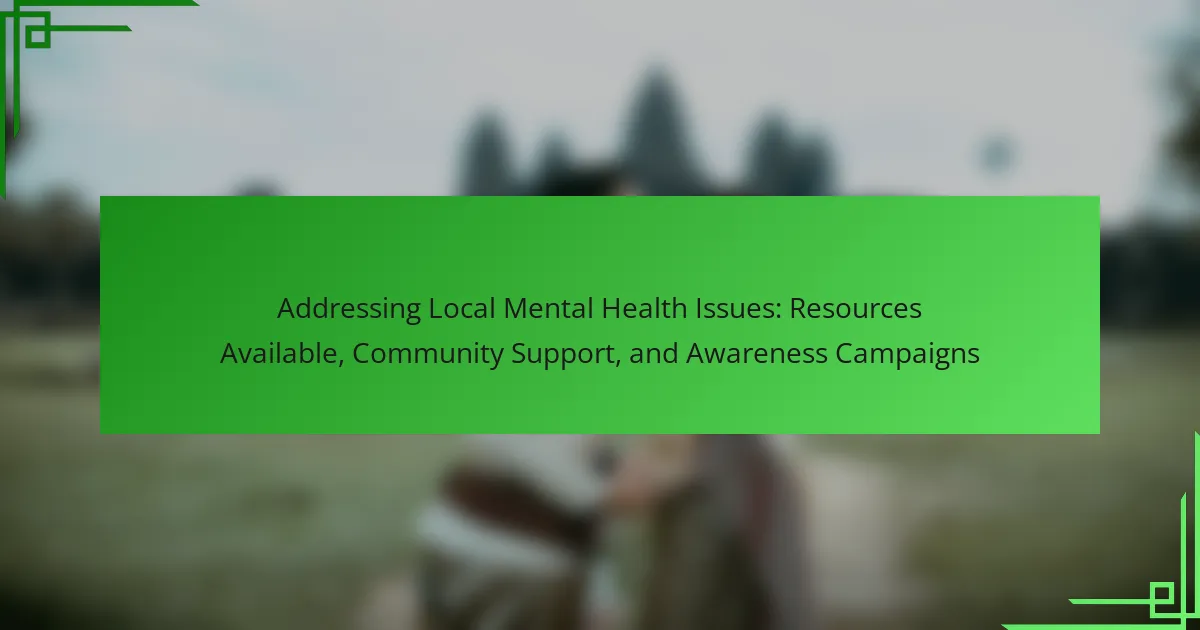Local mental health issues significantly impact communities, with anxiety disorders affecting approximately 19% of U.S. adults, depression impacting around 7% annually, and substance abuse, particularly opioid overdoses, on the rise. Access to mental health care remains a critical barrier, as many communities lack adequate resources and providers, compounded by stigma that discourages individuals from seeking help. Schools serve as vital support systems by providing access to mental health professionals and implementing programs that promote wellness and resilience. This article explores these pressing mental health challenges, the importance of community support, and the role of awareness campaigns in fostering a healthier environment for individuals and families.

What are the key local mental health issues affecting communities?
Key local mental health issues affecting communities include anxiety, depression, substance abuse, and access to care. Anxiety disorders are prevalent, affecting about 19% of adults in the U.S. Depression is also widespread, impacting approximately 7% of the population annually. Substance abuse is a growing concern, with opioid overdoses increasing in many regions. Access to mental health care remains a significant barrier; many communities lack sufficient resources and providers. Stigma surrounding mental health issues further complicates these challenges, discouraging individuals from seeking help. These factors collectively hinder community well-being and highlight the urgent need for targeted mental health initiatives.
How do these issues impact individuals and families?
Mental health issues significantly impact individuals and families. They can lead to emotional distress, affecting daily functioning. Individuals may experience anxiety, depression, or isolation. These conditions can strain family relationships and communication. Families often bear the burden of caregiving, which can lead to stress and burnout. Financial strain may arise from treatment costs or lost income. Children in these families may face academic challenges due to a parent’s mental health issues. Overall, mental health issues create a ripple effect that disrupts family dynamics and overall well-being.
What are the common symptoms associated with local mental health issues?
Common symptoms associated with local mental health issues include anxiety, depression, and mood swings. Individuals may experience persistent sadness or hopelessness. They might also show changes in appetite or sleep patterns. Difficulty concentrating is another frequent symptom. Social withdrawal can occur, leading to isolation from friends and family. Physical symptoms, such as fatigue or unexplained aches, may also manifest. These symptoms can significantly impact daily functioning and quality of life. Recognizing these signs is crucial for seeking help and support.
Why is it important to address these issues at the community level?
Addressing mental health issues at the community level is crucial for effective support and intervention. Local communities can tailor resources to meet specific needs. This localized approach fosters trust and encourages individuals to seek help. Community involvement enhances awareness and reduces stigma surrounding mental health. Research shows that community-based programs lead to better mental health outcomes. For instance, a study by the World Health Organization indicates that community interventions can improve access to care by up to 50%. Involving community members ensures that the solutions are culturally relevant and sustainable. Overall, addressing these issues locally empowers individuals and strengthens community bonds.
What are the underlying causes of local mental health issues?
Local mental health issues often stem from a combination of social, economic, and environmental factors. Poverty is a significant contributor, affecting access to resources and support. Unemployment can lead to feelings of worthlessness and isolation. Additionally, community violence and crime increase stress and anxiety levels. Social isolation further exacerbates mental health challenges. Cultural stigma surrounding mental health prevents individuals from seeking help. Lack of access to mental health services limits treatment options. Educational disparities can also impact mental well-being. These factors collectively create an environment where mental health issues can thrive.
How do socioeconomic factors contribute to mental health challenges?
Socioeconomic factors significantly contribute to mental health challenges. Individuals with lower socioeconomic status often experience higher levels of stress. Financial instability can lead to anxiety and depression. Limited access to healthcare services exacerbates these mental health issues. Education level also plays a role; lower education correlates with increased mental health problems. Additionally, unemployment or job insecurity can negatively impact emotional well-being. Research indicates that people living in poverty face a higher risk of mental disorders. According to the World Health Organization, socioeconomic disparities are a major determinant of mental health outcomes.
What role does stigma play in mental health issues?

What resources are available for addressing local mental health issues?
Stigma plays a significant role in mental health issues by creating barriers to treatment and support. It can lead to discrimination, social isolation, and reduced self-esteem for individuals experiencing mental health challenges. Research indicates that stigma often prevents individuals from seeking help, with studies showing that up to 60% of people with mental health conditions do not seek treatment due to fear of judgment. Stigmatized perceptions can also contribute to negative stereotypes, further exacerbating the problem. Addressing stigma is essential for improving mental health outcomes and encouraging individuals to access available resources and support.
How can individuals access mental health services in their community?
Individuals can access mental health services in their community through various avenues. Community health centers often provide mental health services at low or no cost. Local hospitals may have outpatient mental health programs available. Nonprofit organizations frequently offer counseling and support groups. Additionally, individuals can seek referrals from primary care providers. Online directories can help locate mental health professionals nearby. Many communities have crisis hotlines for immediate support. Insurance providers typically have lists of covered mental health services. These resources ensure individuals find necessary support within their local area.
What types of mental health professionals are available locally?
Local mental health professionals include psychologists, psychiatrists, counselors, and social workers. Psychologists provide therapy and assessment services. Psychiatrists can prescribe medication and offer medical treatment. Counselors focus on specific issues like addiction or family problems. Social workers assist with community resources and support. Each type of professional has specialized training and expertise. This diversity ensures comprehensive mental health support in the community.
What are the benefits of teletherapy and online resources?
Teletherapy and online resources provide accessible mental health support. They eliminate geographical barriers, allowing individuals to connect with therapists from anywhere. This flexibility accommodates various schedules, making therapy more convenient. Additionally, teletherapy often reduces costs associated with in-person visits. According to a study published in the Journal of Medical Internet Research, 75% of participants reported satisfaction with teletherapy. Online resources also offer a wealth of information and self-help tools. These resources can supplement traditional therapy, enhancing overall mental health care.
What community organizations focus on mental health support?
Community organizations that focus on mental health support include the National Alliance on Mental Illness (NAMI) and Mental Health America (MHA). NAMI offers education, support groups, and advocacy for individuals affected by mental illness. Mental Health America provides resources, screening tools, and community-based programs. Both organizations aim to promote mental health awareness and provide support services. Their initiatives are backed by research indicating the importance of community support in mental health recovery. According to the Substance Abuse and Mental Health Services Administration (SAMHSA), community involvement significantly improves mental health outcomes.
How do local nonprofits contribute to mental health awareness?
Local nonprofits contribute to mental health awareness by providing education, resources, and community support. They organize workshops and seminars to inform the public about mental health issues. These organizations often distribute informational materials that highlight the importance of mental health. They also host events that promote open discussions about mental health, reducing stigma. Research shows that community engagement significantly increases awareness and understanding of mental health. According to a report by the National Alliance on Mental Illness, local nonprofits play a crucial role in connecting individuals to mental health services. By fostering partnerships with schools and businesses, they extend their outreach efforts. Their initiatives often lead to increased access to mental health resources for underserved populations.
What role do schools play in providing mental health resources?

How can community support improve mental health outcomes?
Schools play a crucial role in providing mental health resources. They offer access to counselors and mental health professionals. These professionals provide support to students facing emotional challenges. Schools also implement programs that promote mental wellness and resilience. Research indicates that students with access to school-based mental health services show improved academic performance. Additionally, schools create a safe environment for discussing mental health issues. They facilitate awareness campaigns that reduce stigma around mental health. This proactive approach fosters a supportive community for students and their families.
What types of community support systems exist?
Community support systems include various types such as peer support groups, mental health hotlines, and community outreach programs. Peer support groups provide a safe space for individuals to share experiences and coping strategies. Mental health hotlines offer immediate assistance and guidance to those in crisis. Community outreach programs connect individuals with resources and services tailored to their needs. These systems are designed to foster connection, support, and access to mental health resources. Research shows that community support can significantly improve mental health outcomes and reduce stigma.
How can peer support groups aid in recovery?
Peer support groups aid in recovery by providing emotional support and shared experiences. Participants connect with others facing similar challenges. This connection reduces feelings of isolation and loneliness. Peer support fosters a sense of belonging and community. It encourages individuals to share coping strategies and resources. Research indicates that peer support can improve mental health outcomes. A study published in the Journal of Mental Health found that participants in peer support groups reported lower levels of depression and anxiety. These groups empower individuals to take an active role in their recovery. They also enhance motivation and accountability in the recovery process.
What are the benefits of community engagement in mental health initiatives?
Community engagement in mental health initiatives fosters improved mental health outcomes. It enhances awareness of mental health issues within the community. Engaging community members builds trust and reduces stigma around mental health. Collaborative efforts lead to more tailored and effective mental health services. Research shows that communities with high engagement report lower rates of mental health crises. For instance, a study by the National Alliance on Mental Illness found that community-based programs significantly increase access to care. Additionally, community engagement promotes social support networks, which are crucial for mental well-being. Overall, these benefits contribute to a healthier, more informed society.
How can local businesses contribute to mental health awareness?
Local businesses can contribute to mental health awareness by hosting community events focused on mental health education. These events can include workshops, seminars, or support groups. Collaborating with mental health professionals can provide accurate information. Businesses can also display mental health resources in their establishments. This can include brochures or contact information for local mental health services. Sponsoring mental health campaigns can raise awareness in the community. Additionally, businesses can create a supportive environment by training employees on mental health issues. Research shows that workplace mental health initiatives improve overall employee well-being. By actively participating, local businesses play a crucial role in promoting mental health awareness.
What partnerships can be formed between businesses and mental health organizations?
Businesses can form several types of partnerships with mental health organizations. These include sponsorships for mental health awareness events. Businesses can also collaborate on employee mental health programs. Joint workshops can be organized to educate employees on mental health issues. Additionally, businesses can provide funding for mental health initiatives. Partnerships can involve creating resources for mental health support in the workplace. Collaborative research projects can also be established to study mental health trends. These partnerships enhance community support and raise awareness about mental health.
How can workplace wellness programs address mental health issues?
What awareness campaigns are effective in promoting mental health?
Workplace wellness programs can effectively address mental health issues by providing resources and support for employees. These programs often include mental health screenings, counseling services, and stress management workshops. They promote a culture of openness about mental health, reducing stigma. Additionally, they offer training for managers to recognize and respond to mental health concerns. Research shows that organizations with wellness programs see improved employee morale and productivity. A study by the American Psychological Association found that such programs can lead to a 30% reduction in employee absenteeism. Overall, these initiatives create a supportive work environment that prioritizes mental well-being.
Effective awareness campaigns for promoting mental health include community outreach, social media initiatives, and educational workshops. Campaigns like Mental Health Awareness Month engage the public and provide valuable information. They often feature personal stories to resonate with audiences and reduce stigma. Additionally, partnerships with local organizations can enhance outreach and resources. Campaigns that utilize clear messaging and accessible resources tend to have a greater impact. Statistics indicate that increased awareness leads to more individuals seeking help for mental health issues.
How do social media campaigns raise awareness about mental health?
Social media campaigns raise awareness about mental health by disseminating information widely and engaging diverse audiences. They utilize platforms like Facebook, Twitter, and Instagram to share personal stories and statistics. This approach humanizes mental health issues and reduces stigma. Campaigns often use hashtags to create communities and encourage discussions. For instance, the #MentalHealthAwareness hashtag has garnered millions of posts, amplifying voices and experiences. Visual content, such as infographics and videos, is effective in capturing attention. Research shows that social media can lead to increased knowledge and understanding of mental health. A study by the American Psychological Association found that social media campaigns significantly improve public attitudes towards mental health.
What role do events and workshops play in community education?
What are some best practices for individuals to support local mental health initiatives?
Events and workshops serve as vital tools for community education. They provide a platform for sharing knowledge and resources. These gatherings facilitate discussions on mental health topics. Participants gain insights from experts and peers. Workshops often include interactive activities that enhance learning. This engagement fosters a supportive environment for attendees. Research shows that community events can increase awareness and reduce stigma around mental health. For example, the National Alliance on Mental Illness (NAMI) highlights that local events promote understanding and connection. Such initiatives empower individuals to take action in their communities.
The main entity of this article is local mental health issues, which encompass prevalent concerns such as anxiety, depression, substance abuse, and barriers to accessing care. The article examines the impact of these issues on individuals and families, highlighting symptoms and underlying socioeconomic factors that contribute to mental health challenges. It also explores the importance of community-level interventions, available resources, and the role of local organizations in promoting mental health awareness. Additionally, the article discusses effective awareness campaigns and the benefits of community engagement in improving mental health outcomes.


